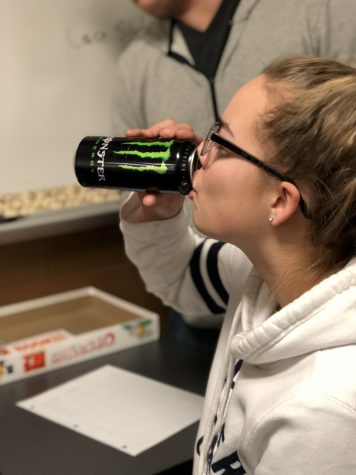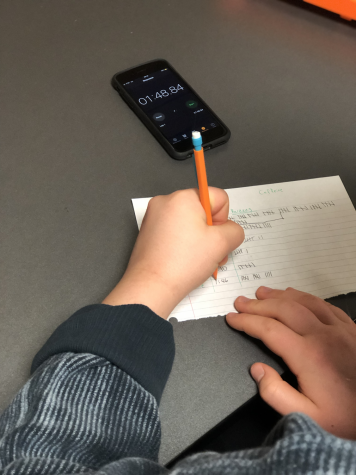
Hello, there! My name is Dylan Torres. I am a senior at SHS and a newcomer to The Journal staff as a features writer! My favorite subject in school is...
While effects differ, students and staff alike consume caffeine
February 22, 2019
SHS staff and students have experienced side effects because of their caffeine consumption. Some show signs of dependency.
“I would be shaking non-stop, and so, I finally cut down (on coffee).
And I (said) ‘yeah, no more,’” sophomore Catriona Edwards said about her experience with caffeine.
Uncontrollable shaking from consuming caffeine was not all Edwards experienced. Other side effects included weight gain, rapid talking, overthinking and severe spasms. She says that she had to quit because her conditions had become so detrimental to her day-to-day life.
Edwards, however, is not the only student to suffer from various side effects as a result of consuming caffeine. Many students and teachers at SHS have shown signs of potential caffeine dependence along with their caffeine-induced side effects.
For Edwards in particular, her experience with caffeine started during the beginning of sophomore year. She says she bought Starbucks most mornings to stay awake. Edwards says she would have upwards of 16 ounces of Starbucks coffee when she did purchase it.
“It keeps me awake when I need to be, but then I would also crash every single time I get home,” Edwards said.
Others who have experienced side effects of caffeine consumption are senior Franklin Flores and junior Keirstin Piatt, who recounted their experiences with caffeine.
Drinking about a half cup most mornings, Piatt believes that her cause for routine guzzling is due to the media.
“(Drinking coffee) is like a trendy thing people do, but I just like (coffee) now,” Piatt said.
She says that she started to drink coffee, her caffeine source, more regularly at the start of her sophomore year to the beginning of junior year and has ever since. Sometimes, though, this results in becoming shaky or anxious.
For Flores, his first experience with caffeine was not so pleasant.
“It was really early in the morning and my dad was (having) coffee, and I was just sorta curious about it,” Flores said. “So, I was like ‘Can I have some?’ and he was like ‘Sure,’ and I burned my mouth on it.”
Consuming caffeine was later prompted by a need to stay awake. Flores says he would stay up late studying for his classes, making him tired. His remedy, energy drinks.
“I was so tired in the morning because I would be staying up to 2 (or) 3 a.m., so I had to find a way to cope with it: ya know, energy drinks,” Flores said.
His addiction, as he calls it, to the energy drinks began freshman year. At the start, he would have energy drinks two or three times a week. Now, the rate at which he consumes those drinks is up to five to seven times a week. This includes one every morning and sometimes an extra one with lunch.
While the caffeine from the energy drinks did provide temporary alertness to Flores, the aftermath of consuming them took a toll on him as well.

“When I have an energy drink, I feel my heart going ten times faster than it should be,” Flores said.
In addition to an accelerated heartbeat, Flores says that sometimes the sleepiness that he tried to prevent by consuming energy drinks only made his condition worse. His fatigue would remain, he would become winded after too much exercise and his stamina would reduce faster. None of which used to happen at the start of his caffeine consumption.
Edwards, Flores and Piatt are not the only students that consume caffeine though. In a poll of 166 students conducted by The Journal, 62.65 percent drink at least one to two 8-oz cups of coffee or one to two 12-oz cans of soda on a typical day.
According to Registered Dietitian Nutritionist CD Angela Potts, students should be consuming caffeine in limited amounts. She believes that if a student does ingest caffeine then the intake should be limited to 100mg– one cup of coffee or two soft drinks– per 24 hours.
“My personal opinion is that teens should avoid caffeine,” Potts said in a message to The Journal. “It is not a nutrient and is not required by the body.”
One detrimental side effect she mentions is that teens may not be able to get enough sleep.
Yet, students aren’t the sole consumers of caffeine. In another survey involving 117 staff members conducted by The Journal and some of Daryl Traylor’s science classes, 84.7 percent reported that they consume at least some caffeine on a typical day.
According to SHS English teacher Sarah Gott-Helton, she has some form of caffeine every day during lunch and occasionally in the morning with breakfast. While she doesn’t drink coffee, her caffeine comes from chocolate, tea and Diet Coke for the most part.
“I think more than anything it’s just a nice kind of pick-me-up in the afternoon,” Gott-Helton said.
She says that, as a result, she doesn’t suffer from “withdrawal symptoms” as others might when she doesn’t consume caffeine.
However, for SHS business teacher Kenneth Slaughter, his experience with caffeine consumption happened to be more intense. Slaughter says he cut out most of the caffeine in his life at the beginning of last summer because he realized he was consuming too much. A side effect of caffeine consumption Slaughter dealt with was a change in his mood.
“At the end of the day, I just felt sluggish and kinda ‘bleh,’” Slaughter said.
When he would drink Diet Coke, his caffeine source, more regularly, he felt the need to have it more.
“My day was not complete without it, especially my morning,” Slaughter said. “I feel like it’s more of a mind over matter thing, but it was definitely hard to function.”

To quit, he replaced all the Diet Cokes with water and drank as much of it as he could. He would occasionally treat himself to a beverage that contained caffeine, like sweet tea, to ensure he would stay away from a more-heavily-caffeinated drink.
“I didn’t want to supplement it (with) anything (else that has caffeine) because I thought I would just go back to drinking Diet Coke,” Slaughter said.
While the more negative health ramifications of consuming coffee may be more recognizable to people, caffeine does have its potential benefits.
These potential benefits include boosting long-term memory, reducing suicide risks in adults, reducing the risk of liver cancer, halving the risk of mouth and throat cancer and protecting against type 2 diabetes, Parkinson’s disease, cardiovascular disease and strokes, according to Medical News Today.
SHS nurse Tracy Chupp has also mentioned that caffeine can have a positive impact.
“Caffeine can have benefits, too,” Chupp said. “A lot of your migraine medicines like Excedrin (have) caffeine in it, because it is proven to help with headaches.”
She mentions that she would consume coffee to help “take on the day,” and students from her high school would sometimes take either 5-hour energy or caffeine pills called NoDoz to stay up for later night studying.
Whether or not an individual experiences the benefits or drawbacks of consuming caffeine, Chupp says it should be done in moderation.
“I think everything in life should be in moderation,” Chupp said. “It is okay to have dessert, but it is not okay to have dessert three meals a day. I think the same goes along with caffeine.”
[infogram id=”10a41992-12ec-43df-9b9e-c3681699f39f” prefix=”sDn” format=”interactive” title=”Infographic Modern”]
Infographic by Lyndsay Valadez

Hello, there! My name is Dylan Torres. I am a senior at SHS and a newcomer to The Journal staff as a features writer! My favorite subject in school is...